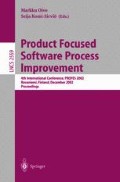Abstract
The primary objective of this paper was to propose and empirically test a theoretical model for Software Quality Evaluation based on Gutman's Means-End Chain Model. Recent studies of Gutman's Model have found it significant for software quality evaluation. As such the proposed framework introduces the first theoretical model for software quality evaluation, which considers the motivation behind the quality evaluation, and the utilization of cognitive structures to describe these relationships. The framework not only gives the rationale for the choice of characteristics used in software quality evaluation, but also introduces the possibility that the characteristics can be used to measure the capability for attaining desired consequences and sought after values. To test this proposed framework, a study of 22 commercial Australian companies was conducted and analyzed with Path Analysis. Results of the analysis provided a number of important insights and suggest several conclusions. The study showed (1) that there is support for applying Gutman's Means-end chain model as the theoretical foundation for a framework on software quality evaluation; (2) that characteristics can be used as a measure to predict the capability of the software on desired consequences and values; (3) that non-ISO9126 characteristics are also important for software evaluation; (4) that the characteristic, consequence, value relationship can be valuable to benefit the Goal Question Metric model
Access this chapter
Tax calculation will be finalised at checkout
Purchases are for personal use only
Preview
Unable to display preview. Download preview PDF.
References
Wong, B. & Jeffery, R.: Cognitive Structures of Software Evaluation: A Means-End Chain Analysis of Quality, Proceedings of the Third International Conference, PROFES 2001, 2001, pp 6–26.
Wong, B: The Appropriateness of Gutman’s Means End Chain Model in Software Evaluation, Proceedings of the 2002 International Symposium on Empirical Software Engineering, ISESE 2002, pp 56–65.
Wong, B. & Jeffery, R.: Quality Metrics: ISO9126 and Stakeholder Perceptions, Proceedings of the Second Australian Conference on Software Metrics, 1995, pp 54–65.
Wong, B. & Jeffery, R.: A Pilot Study of Stakeholder Perceptions of Quality, Technical Report, CSIRO, 1996.
Gutman, J.: A Means-End Chain Model Based on Consumer Categorization Processes, Journal of Marketing, 46 (Spring): 60–72.
Gutman. J.: Means-End Chains as Goal Hierarchies, Psychology & Marketing, 14 (6):1997 545–560.
Bagozzi, R.: Goal-directed behaviours in marketing: cognitive and emotional, Psychology & Marketing, 14, Sept 1997, pp 539–543.
Valette-Florence, P.: A Causal Analysis of Means-End Hierarchies in a Crosscultural Context: Metholodogical Refinements, Journal of Business Research, v 42 No 2 June 1998, pp 161–166.
Bagozzi, R. and Dabholkar, P.: Discursive psychology: an alternative conceptual foundation to means-end chain theory, Psychology & Marketing, 17, July 2000, pp 535–586.
Kahle L, Beatty S and Homer P.: Alternative Measurement Approaches to Consumer Values: The List of Values (LOV) and Values and Life Style (VALS), Journal of Consumer Research, 13 December, 1986, 405–409.
Oppenheim A: Questionnaire Design, Interviewing and Attitude Measurement, London: Pinter, 1992.
Payne S: The Art of Asking Questions, New Jersey: Princeton University, 1951.
Maddala G: Introduction to Econometrics, New York: Macmillan, 1992.
Kim J and Mueller C: Introduction to Factor Analysis. What it is and how to do it, London: Sage, 1978.
Anderson T and Zelditch M: Basic Course in Statistics, New York: Holt, Rinehart and Winston, 1968.
Wong, B: An Investigation of the Cognitive Structures used in Software Quality Evaluation, Unpublished PhD Thesis, University of New South Wales, 2002.
Wright S: The Method of Path Coefficients, Annals of Mathematical Statistics, 5, 1934, pp. 161–215.
Ullman J B: Structural Equation Modeling (in Using Multivariate Statistics, Third Edition, B G Tabachnick and L S Fidell Eds), HarperCollins College Publishers, New York, NY, 1996, pp. 709–819.
Bollen K A: Structural Equations with Latent Variables, John Wiley & Sons, New York, 1989.
Marsh H W, Balla J R and McDonald R P: Goodness of Fit Indices in Confirmatory Factor Analysis: The Effect of Samle Size, Psychological Bulletin, 103(3), 1988, pp. 391–410.
Tanaka J S: Multifaceted Conceptions of Fit in Structural Equation Model, in K. A. Bollen & J. Scott Long (Editors), Testing Structural Equation Models, Newbury Park, CA: Sage, 1993, pp. 10–39.
Hoyle R and Panter A: Writing About Structural Equation Models, in Structural Equation Modeling, Concepts, Issues and Applications, R. H. Hoyle (ed), Sage Publications, Thousand Oaks, CA 1995, pp. 158–176.
Chin W W: Issues and Opinion on Structural Equation Modeling, Management Information Systems Quarterly, 22(1), Mar 1998.
MacCallum R C, Wegener D T, Uchino B N, Fagbrigar L R: The Problem of Equivalent Models in Applications of Covaraiance Structure Analysis, Psychological Bulletin, 114(1), 1993, pp.185–199.
Breckler S J: Application of Covariance Structure Modeling in Psychology: Cause for Concern?, Psychological Bulletin, 107(2), 1990, pp. 260–372.
Jöreskog K G & Sörbom D: Lisrel 8: User’s Reference Guide, Chicago: Scientific Software, 1993.
Bentler P M: Drug use and personality in Adolescence and Young Adulthood: Structural Model with Nonnormal Variables, Child Development, 58, 1987, pp. 65–79.
Bentler P M & Bonnett D G: Significance Tests and Goodness of Fit in the Analysis of Covariance Structures, Psychological Bulletin, 88, 1980, pp. 588–606.
Bentler P M: Comparative Fit Indexes in Structural Model, Psychological Bulletin, 107, 1990, pp. 238–246.
Cohen J: Statistical Power Analysis for the Behavioural Sciences, 2nd Edition, Hillsdale,NJ: L. Erlbaum Associates, 1988.
Rombach D and Basili V: Practical Benefits of Goal-Oriented Measurement, Proceedings Annual Workshop of the Centre for Software Reliability: Reliability and Measurement, Garmisch-Partenkirchen, Germany: Elsevier, 1990.
Author information
Authors and Affiliations
Editor information
Editors and Affiliations
Rights and permissions
Copyright information
© 2002 Springer-Verlag Berlin Heidelberg
About this paper
Cite this paper
Wong, B., Jeffery, R. (2002). A Framework for Software Quality Evaluation. In: Oivo, M., Komi-Sirviö, S. (eds) Product Focused Software Process Improvement. PROFES 2002. Lecture Notes in Computer Science, vol 2559. Springer, Berlin, Heidelberg. https://doi.org/10.1007/3-540-36209-6_11
Download citation
DOI: https://doi.org/10.1007/3-540-36209-6_11
Published:
Publisher Name: Springer, Berlin, Heidelberg
Print ISBN: 978-3-540-00234-5
Online ISBN: 978-3-540-36209-8
eBook Packages: Springer Book Archive

